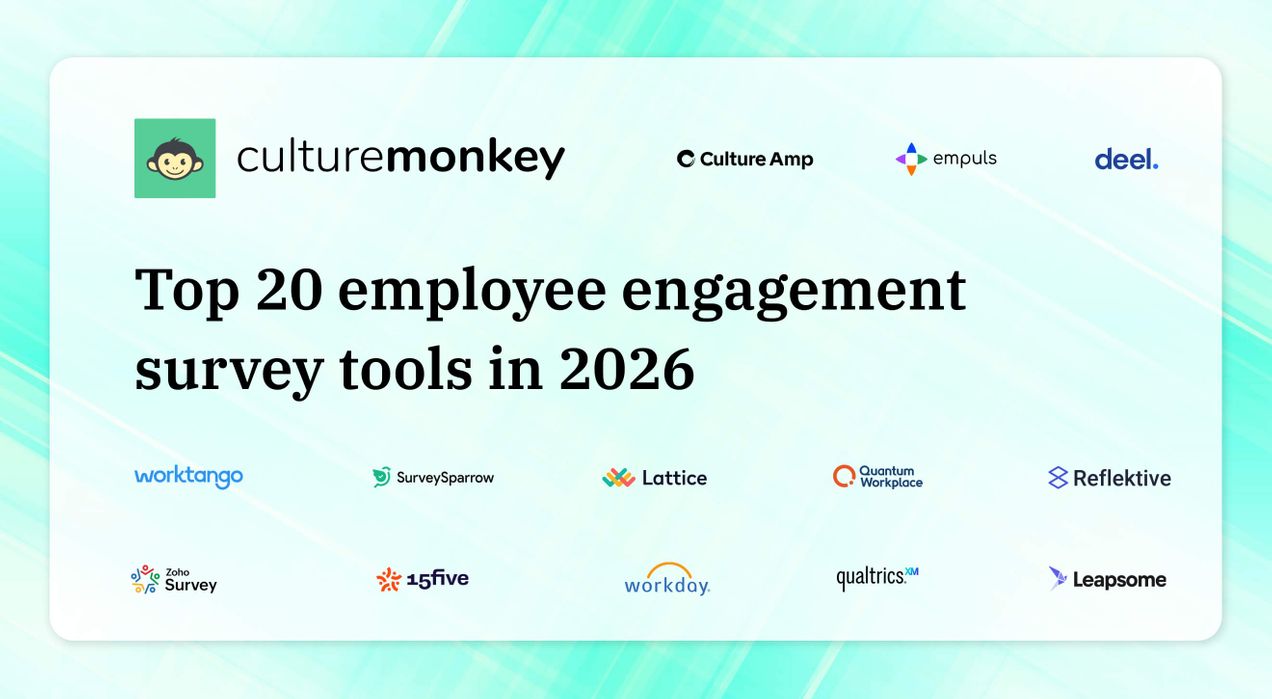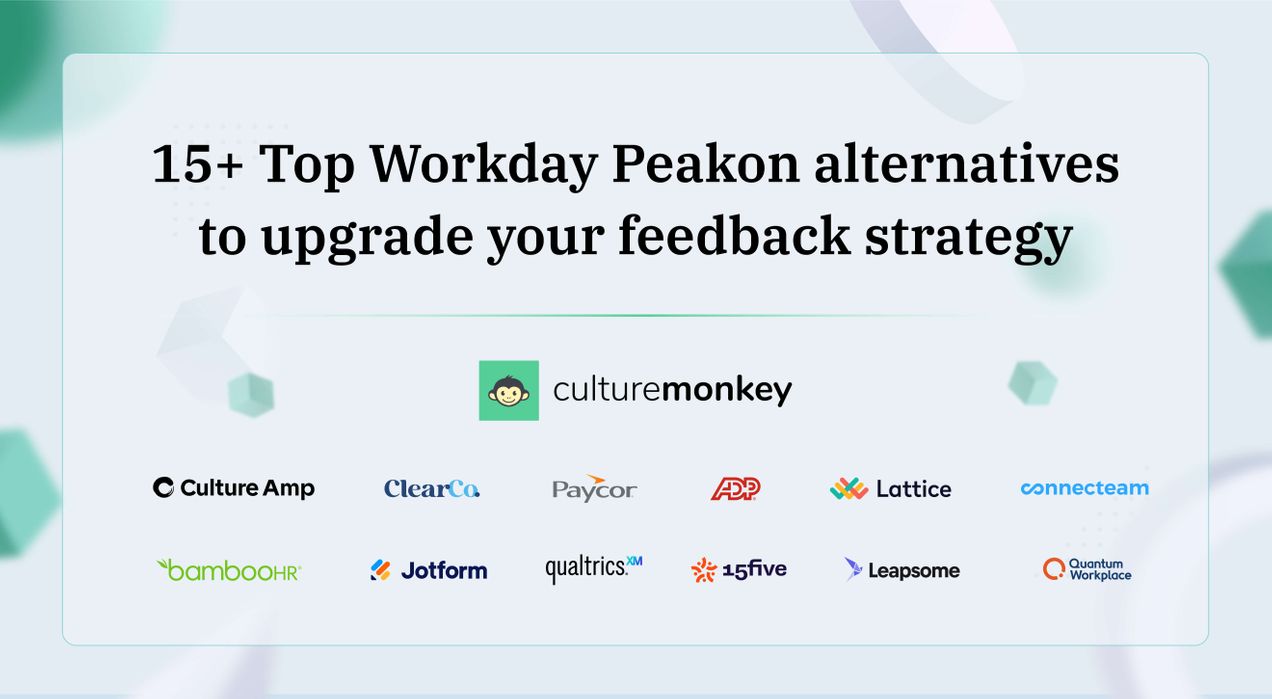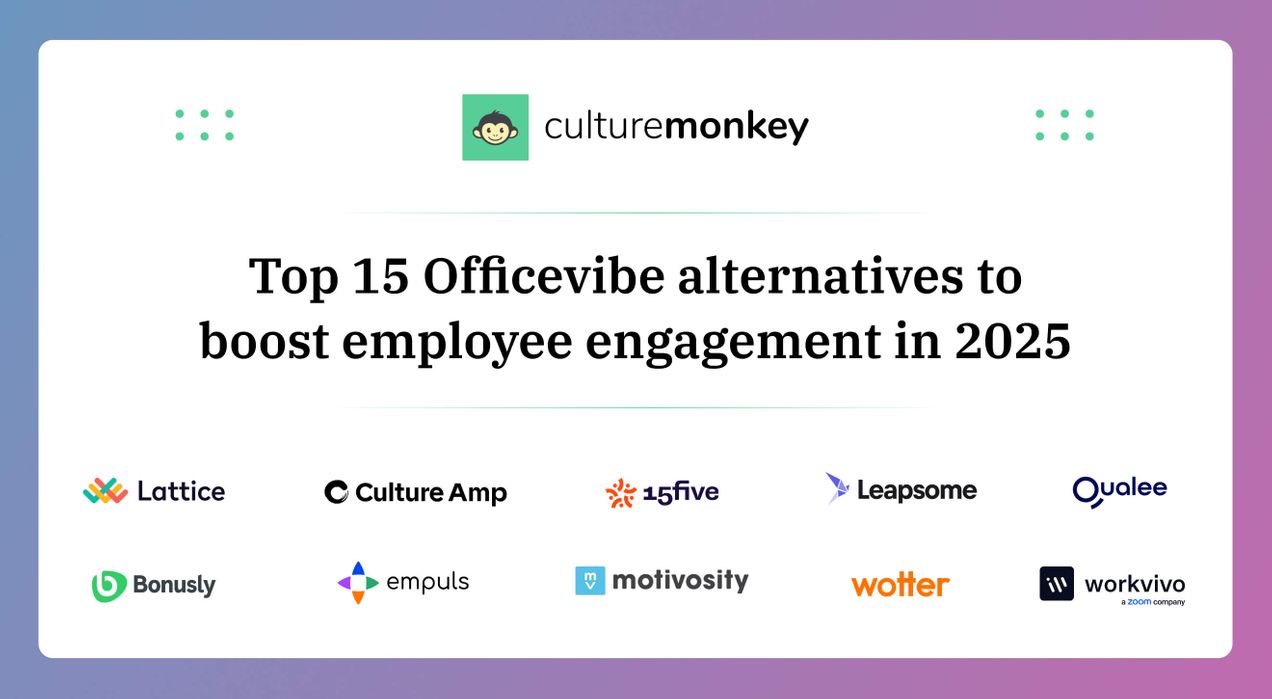Employee engagement survey vendor evaluation checklist for 2026

Think of buying a car. You wouldn’t just glance at the exterior and sign the papers—you’d check the engine, safety features, fuel efficiency, and maybe even take it for a test drive.
Choosing an employee engagement survey vendor works the same way. On the surface, many platforms look polished, but the real value lies in the details—scalability, analytics, customization, security, and ongoing support.
Without a careful evaluation, you risk investing in something that appears promising but ultimately falls short when it matters most. That’s why having a vendor evaluation checklist is crucial in 2026—to separate flashy promises from tools that truly deliver impact.
TL;DR
Why is evaluating survey vendors critical for employee engagement success?

TL;DR
Not all survey tools fit your culture, and choosing wrong leads to poor participation and generic results. A strong evaluation process ensures surveys match employee needs, boosting engagement and minimizing fatigue.
The right vendor also safeguards data, scales with growth, and provides actionable insights—turning feedback into change rather than another HR checkbox.
Not all survey platforms are built the same—and neither are your people.
Think of it this way: choosing the wrong vendor is like giving every employee the same shoe size and expecting them to run.
A carefully designed evaluation checklist helps avoid mismatches, boost response rates, and reduce survey fatigue—before any contract is signed.
One-size-fits-all survey tools often miss the mark
Generic survey platforms rarely align with your unique culture, goals, or workforce needs. A top-tier vendor allows you to customize everything—from survey frequency to question logic—so your data reflects what actually matters, leading to high-performing employees. That’s where the vendor selection checklist for HR becomes essential.
Poor UX = Poor response rates
If your survey platform feels clunky, confusing, or dated, don’t expect even your engaged employees to be enthusiastic participants. Engagement survey software features should be easy to navigate and accessible on all devices.
A low-friction user experience is non-negotiable for meaningful participation and ultimately impacts job satisfaction.
Lack of action-oriented insights leads to feedback fatigue
Collecting data is one thing—doing something about it is another. The best effective employee engagement survey vendors turn raw feedback into AI-backed insights that help you take action fast. Without that, your engagement strategy stays stuck at square one.
Data security lapses can tank employee trust
Employees won’t share honestly if they doubt your system’s privacy safeguards. A credible survey vendor must support anonymous submissions, end-to-end encryption, and GDPR compliance to maintain employee morale. This isn’t just IT’s problem—it’s a trust issue for your entire organization, which is essential to ensure employees feel valued.
Limited scalability hinders long-term growth
Choosing a vendor that can't scale with your growing team means you'll be vendor-shopping again in 12 months. Whether you’re onboarding 50 or 5,000 employees, the HR survey vendor checklist should account for flexible scaling without breaking the platform.
Weak reporting limits HR's decision-making power
You don’t just need data—you need clear dashboards, filters, and drill-down options that make decision-making smarter and faster. Strong analytics is a deal-breaker when conducting an employee survey tools comparison across vendors, enabling more informed decisions based on actionable data.
No integration = more manual work
Your survey platform should play nicely with your existing ecosystem—HRMS, Slack, Teams, email, you name it. Without integrations, you’ll waste time juggling logins and exporting spreadsheets instead of driving impact. That’s where a full survey vendor evaluation guide really pays off.
Employee engagement survey vendor evaluation checklist

Picture this: evaluating vendors without a checklist is like shopping without a list—you’ll likely miss essentials and overpay for extras. With the right checklist, you focus on what truly drives employee participation, trust, and long-term success.
1. Does the vendor offer customizable survey templates?
Rigid, pre-set surveys rarely capture the nuances of your workforce. Look for a vendor that offers customizable templates you can tailor by role, department, or company goals. This kind of flexibility is a core requirement in any HR survey vendor checklist.
2. Can the platform support pulse, annual, and lifecycle surveys?
Your survey needs evolve throughout the year—from quick pulse checks to in-depth annual reviews. A vendor should offer a range of formats to meet these varied needs. This versatility is key when conducting a comparison of employee survey tools comparison, as it can influence work-life balance.
3. Is the feedback collection process anonymous and secure?
Confidentiality builds trust. Ensure the vendor supports anonymous surveys, secure data encryption, and meets global compliance standards. Data privacy isn't optional—it's the foundation for honest, actionable feedback, which is essential for employee satisfaction.
4. Does the vendor provide AI-powered sentiment analysis?
AI can uncover patterns humans miss. Sentiment analysis helps decode emotions and themes across thousands of responses. The best employee engagement survey vendors will offer these insights out of the box to drive smarter decisions.
5. Are real-time dashboards and engagement heatmaps available?
Static reports are outdated. Look for real-time dashboards and visual heatmaps that let HR track engagement trends instantly. These engagement survey software features save time and make feedback more digestible for leadership.
6. How strong are the reporting and analytics features?
It’s not just about data—it’s about what you do with it. The platform should offer filters, comparative trends, and export-ready reports. A good vendor selection checklist for HR must include a close review of reporting capabilities.
7. Can the vendor integrate with HRMS, Slack, Teams, and other workplace tools?
Seamless integration reduces manual effort and boosts participation. Whether it's syncing data from your HRMS like Workday, or nudging employees via Slack, Teams, integration keeps everything connected. This is where the CultureMonkey survey platform excels with built-in compatibility, fostering an engaged workforce.
8. Does the vendor comply with GDPR and other data privacy regulations?
Compliance isn't a feature—it's a legal necessity. Make sure the vendor meets GDPR, SOC 2, and other relevant standards. A lack of compliance could expose you to risk and erode employee trust, impacting your organization's success instantly.
9. Is the platform scalable for a growing workforce?
Your team today won’t be your team tomorrow. The platform should handle scale without compromising speed or user experience. Scalability is a critical feature in any employee engagement survey vendor evaluation checklist, ensuring effective management of employee survey data.
10. What kind of onboarding and implementation support is provided?
The launch process sets the tone for success. Vendors should offer guided onboarding, training resources, and hands-on implementation support. Otherwise, your HR team might end up spending weeks untangling setup issues.
11. Are there features to prevent survey fatigue among employees?
Too many surveys can backfire. Look for features like smart scheduling, question rotation, and response throttling. This helps keep feedback fresh and prevent burnout—key points in any survey vendor evaluation guide for your engagement efforts.
12. Does the vendor offer text intelligence for open-ended responses?
Open-ended responses offer rich insights—but only if you can analyze them efficiently. Text intelligence uses NLP to surface trends and themes, turning raw comments into digestible insights. This is where the CultureMonkey survey platform shines.
13. Can the vendor import historical survey data for trend analysis?
Comparing past and present data is essential for long-term improvement. The vendor should allow seamless import of historical datasets to identify trends and analyze survey results. If they can’t, you’re starting from scratch every year.
14. What is the pricing model, and does it offer value for money?
Transparency matters. Understand if the vendor offers tiered pricing, flat rates, or per-user billing—and whether those costs align with the engagement survey software features they deliver. Value beats low cost every time in fostering a positive work environment.
15. Does the vendor provide case studies or customer success stories?
Real-world results speak louder than feature lists. Vendors who can show proven impact with case studies offer more credibility. Use this as part of your employee survey tools comparison process.
16. Is there a dedicated customer support team for troubleshooting?
When things break (and they will), who picks up the phone? A responsive, knowledgeable support team is non-negotiable. Ask if support is live, email-based, or ticketed—and how fast they respond.
17. Are advanced features like benchmarking and industry insights included?
Context adds value. Benchmarking lets you compare your scores with similar organizations, while industry insights highlight key improvement areas. These advanced features are hallmarks of the best employee engagement survey vendors.
18. Does the platform offer multilingual and mobile-friendly surveys?
A global workforce needs surveys in multiple languages, accessible on any device. Multilingual and mobile-first design ensures everyone can participate, regardless of location or tech setup, which greatly enhances employee satisfaction and workplace satisfaction —another reason the CultureMonkey survey platform stands out.
19. Can the vendor provide tailored reporting by department or location?
Leadership teams need insights relevant to their slice of the organization. Tailored reporting by location, department, or tenure helps leaders take targeted action—crucial when following any vendor selection checklist for HR.
20. What innovations or AI-driven features set this vendor apart?
Last but not least, what’s new and next? The best vendors bring continuous innovation—think predictive analytics, automated action plans, or AI-driven nudges. These features set leaders apart from basic survey tools.
What to look for in an employee engagement survey vendor

TL;DR
Great vendors go beyond templates—they offer flexibility for pulse, onboarding, and deep-dive surveys tailored to your goals. Look for AI-driven insights that translate feedback into action, not just numbers.
They must also ensure data security, scale with your workforce, and integrate seamlessly with HRMS and tools like Slack—making surveys both secure and effortless.
Knowing exactly what to look for in a survey vendor saves time, avoids costly mistakes, and builds lasting engagement success. A strong vendor goes beyond distributing questions—they provide trust, flexibility, and insights that leaders can act on.
Here's what should top your employee engagement survey vendor evaluation checklist.
- Strategic flexibility, not just survey templates: The best vendors let you build what you need—whether that’s quarterly pulse surveys, onboarding feedback, or deep-dive engagement reports. This adaptability is critical to ticking off boxes in any vendor selection checklist for HR.
- Actionable insights, not just raw data: Look beyond dashboards. Does the vendor help you interpret data and recommend next steps? With AI-powered insights and trend alerts, the CultureMonkey survey platform transforms feedback into something leadership can act on.
- Reliable data security and compliance: Your vendor should be fully compliant with GDPR and offer top-tier encryption standards. If employees don’t trust your feedback process, engagement data becomes meaningless. Data security must be front and center.
- Scalable design for growing teams: A solid platform should handle everything from startups to enterprises without breaking. Scalability ensures you don’t need to re-evaluate your vendor every time your headcount changes—an important note in every survey vendor evaluation guide.
- Seamless integrations with existing tools: Survey platforms shouldn’t live in isolation. Ensure the vendor offers out-of-the-box integrations with your HRMS, Slack, Teams, and more. That’s where the CultureMonkey survey platform really proves its value.
- Innovation that keeps pace with HR needs: Employee feedback is evolving fast, and so should your platform. Look for vendors who lead with innovation—like AI sentiment analysis, NLP-driven text intelligence, or benchmarking dashboards—to stay ahead of the curve.
The difference between basic survey tools and full-service engagement vendors

Basic survey tools might get the job done—if all you're doing is sending a few employee survey questions and collecting responses. But when your goal is real engagement, you need more than a form builder.
Here's a side-by-side comparison to help you differentiate during your employee engagement survey vendor evaluation checklist process:
| Basic Survey Tools | Full-Service Engagement Vendors |
|---|---|
| Limited templates with minimal customization | Flexible, customizable survey templates tailored to employee lifecycle stages |
| One-time survey capability | Supports pulse, annual, onboarding, exit, and other lifecycle surveys |
| Manual analysis and static reports | AI-driven sentiment analysis and dynamic, real-time dashboards |
| No or minimal integrations | Seamless integrations with HRMS, Slack, Teams, and more |
| Lacks benchmarking and trend analysis | Includes benchmarking, historical trend tracking, and industry insights |
| Generic data exports with little guidance | Actionable recommendations, tailored reporting by department/location |
| Basic support, often self-service only | Dedicated customer success teams, onboarding, and troubleshooting support |
7 Key features of a great employee survey platform

TL;DR
The best platforms balance customization with intelligence. They offer adaptable templates, AI-powered sentiment analysis, and anonymous, GDPR-compliant feedback collection to build employee trust.
Equally important are real-time dashboards, tool integrations, scalability, and benchmarking—helping HR act quickly, track progress, and measure engagement against industry standards.
The key to choosing a great employee survey platform? It should do more than collect answers—it should turn feedback into action.
Think of it like this: The best tools help you listen, learn, and lead with confidence.
Here are 7 essential features to prioritize in your evaluation checklist.
- Customizable templates for different survey types: Look for pre-built templates that can be easily adapted for pulse, annual, onboarding, and exit surveys. Customization ensures your employee engagement survey questions align with team goals, culture, and current engagement challenges.
- AI-powered sentiment and text analysis: AI-driven features like sentiment tracking and text intelligence help make sense of thousands of open-ended responses. These insights reduce guesswork and uncover hidden engagement drivers—key highlights of the CultureMonkey survey platform.
- Anonymous, secure feedback collection: Trust drives honesty. The platform should ensure anonymity and follow top-tier data protection protocols like GDPR. Without this, survey responses will be skewed or limited.
- Real-time dashboards and dynamic analytics: You shouldn't have to wait weeks for insights. Real-time dashboards and customizable analytics let HR and managers respond to trends fast. These are crucial engagement survey software features for agile decision-making.
- Integration with HR and communication systems: A great platform should connect effortlessly with your HRMS, Slack, Teams, and other tools. This streamlines data flow and makes survey distribution and reminders part of daily workflows.
- Scalability for workforce growth: Whether you're growing from 100 to 1,000 or are already enterprise-scale, the platform should scale without losing performance or user experience. This is often missed in rushed employee survey tools.
- Benchmarking and historical trend tracking: Your engagement data is more meaningful when placed in context. The best platforms allow industry benchmarking and import historical data to help you track long-term progress.
Mistakes HR teams make when choosing survey vendors

TL;DR
Cost-cutting, ignoring integrations, and skipping compliance checks undermine engagement. Without anonymity and data security, employees won’t respond honestly—making the survey effort meaningless.
Other pitfalls include overlooking scalability, mobile access, and action-driven insights. Choosing a “tool” instead of a strategic partner often leaves HR with limited support and stagnant engagement programs.
Even with the best intentions, HR teams can fall into a few common traps when selecting a survey partner. These missteps can stall your engagement goals or lead to wasted investment. Here are the top mistakes to watch out for during your employee engagement survey vendor evaluation checklist process:
1. Prioritizing cost over value
Choosing the cheapest option may save money short term, but it often leads to lackluster features and limited support. Instead, compare engagement survey software features and long-term value—not just upfront price.
2. Ignoring integration capabilities
Many HR teams overlook how well the platform works with existing tools like HRMS, Slack, or Teams. This creates extra manual work and low adoption. Always prioritize integration in your vendor selection checklist for HR.
3. Overlooking data privacy and compliance
Failing to confirm GDPR compliance or anonymous feedback options can jeopardize employee trust. Data security should never be an afterthought—your HR survey vendor checklist should flag it early, especially when handling quantitative data.
4. Underestimating the need for action-driven insights
Collecting feedback is easy. Acting on it isn’t. Teams often choose platforms that don’t provide clear, actionable insights—making the survey effort feel pointless to employees.
5. Neglecting multilingual or mobile access
In diverse or remote workplaces, survey accessibility is key. If employees can’t respond in their language or on mobile, participation plummets, which can negatively affect customer loyalty and employee mental health. This is where the CultureMonkey survey platform offers a clear edge.
6. Not evaluating scalability for future growth
What works for 200 employees may fail at 2,000. HR teams sometimes skip assessing scalability, only to outgrow their platform too soon. It's a mistake that shows up late—but ultimately affects business outcomes and costs a lot to fix.
7. Choosing a tool, not a partner
Survey tools aren’t just software—they're part of your engagement strategy. Skipping over onboarding support, customer success, or innovation roadmap discussions can lead to mismatched expectations regarding professional growth.
Why CultureMonkey is the all-in-one survey vendor for actionable insights

TL;DR
CultureMonkey combines AI-powered insights, text intelligence, and pulse surveys designed to prevent fatigue—turning employee feedback into strategy-ready actions.
Its scalable, multilingual, mobile-first platform integrates seamlessly with HRMS, Slack, and Teams, ensuring every employee voice is heard while HR saves time. It’s more than a survey tool, it’s a long-term engagement partner.
If you're tired of juggling clunky tools, siloed feedback, and shallow reports, it's time for a survey partner that actually delivers on its promises. CultureMonkey checks every box on your employee engagement survey vendor evaluation checklist—and then some. Here’s why it stands out from the noise.
- Real-time AI insights that drive action: CultureMonkey uses AI to go beyond the numbers—automatically detecting sentiment shifts, burnout indicators, and team-specific issues. These insights help managers take timely action, making it more than just a data collection tool.
- Pulse surveys designed for frequency without fatigue: Run weekly, monthly, or quarterly pulse surveys that feel effortless for employees. Smart scheduling and question rotation features prevent fatigue while maintaining consistent engagement—a key highlight of their engagement survey software features.
- Text intelligence that makes open feedback usable: Forget scanning through hundreds of comments manually. CultureMonkey’s text intelligence uses NLP to categorize and highlight key themes from open-ended responses, turning employee voice into strategy-ready insights.
- Seamless HRMS integrations for smarter workflows: CultureMonkey integrates natively with major HRMS platforms, Slack, Teams, and more. This ensures feedback loops fit directly into your existing tech stack, saving HR teams from manual effort and boosting participation.
- Built for scale, built for people: Whether you're a 100-person startup or a 10,000-person enterprise, CultureMonkey scales with ease—without compromising experience or insight depth. And with multilingual, mobile-friendly surveys, it works for every employee, everywhere.
Conclusion
Choosing the right employee engagement survey vendor isn’t just a tech decision—it’s a people decision. The right platform empowers HR teams to listen actively, respond thoughtfully, and drive measurable improvements across the employee journey.
By using a thorough employee engagement survey vendor evaluation checklist, you can avoid generic tools and select a partner that offers flexibility, scalability, and intelligence.
From customizable templates to AI-powered insights and seamless integrations, every feature should support real action—not just data collection. And if you're looking for a vendor that checks all the right boxes with ease, CultureMonkey delivers.
With features like pulse surveys, text intelligence, and key HRMS integrations, CultureMonkey is your go-to platform for transforming employee feedback into lasting engagement.
Summary
FAQs
1. How do I evaluate employee engagement survey platforms?
Start with a clear employee engagement survey vendor evaluation checklist that covers features, security, integrations, support, scalability, and analytics. Assess vendors based on how well they align with your engagement goals and tech stack. Look for case studies, demo the platform, and involve key stakeholders in the decision to ensure a strong long-term fit.
2. What features are most important in a survey vendor?
The most important features include customizable templates, anonymous feedback collection, real-time dashboards, AI-powered sentiment analysis, and integrations with HRMS and communication tools. These engagement survey software features ensure high participation, actionable insights, and workflow compatibility—essentials for driving strategic decisions and meaningful change through employee feedback.
3. How can I compare pricing among survey vendors?
Compare pricing by evaluating what’s included at each tier—number of users, surveys, features, and support levels. Check whether the model is per-user, flat-rate, or usage-based. Focus on long-term value rather than cost alone. A vendor offering deeper insights and scalability may justify a higher price than limited employee survey tools.
4. Why is data security critical in employee engagement survey tools?
Data security ensures that employees feel safe sharing honest feedback. Look for vendors that offer encryption, secure servers, and GDPR compliance. Without strong data protection, trust is compromised, participation drops, and meaningful feedback quality suffers. Security is a core requirement in any HR survey vendor checklist.
5. Should I choose a vendor over an in-house survey system?
Yes—vendors offer advanced features like AI insights, benchmarking, integrations, and real-time dashboards that in-house systems typically lack. Full-service platforms save time, scale easily, and ensure better data handling. Partnering with the right vendor simplifies your workflow and provides more strategic value than building and managing tools internally.










